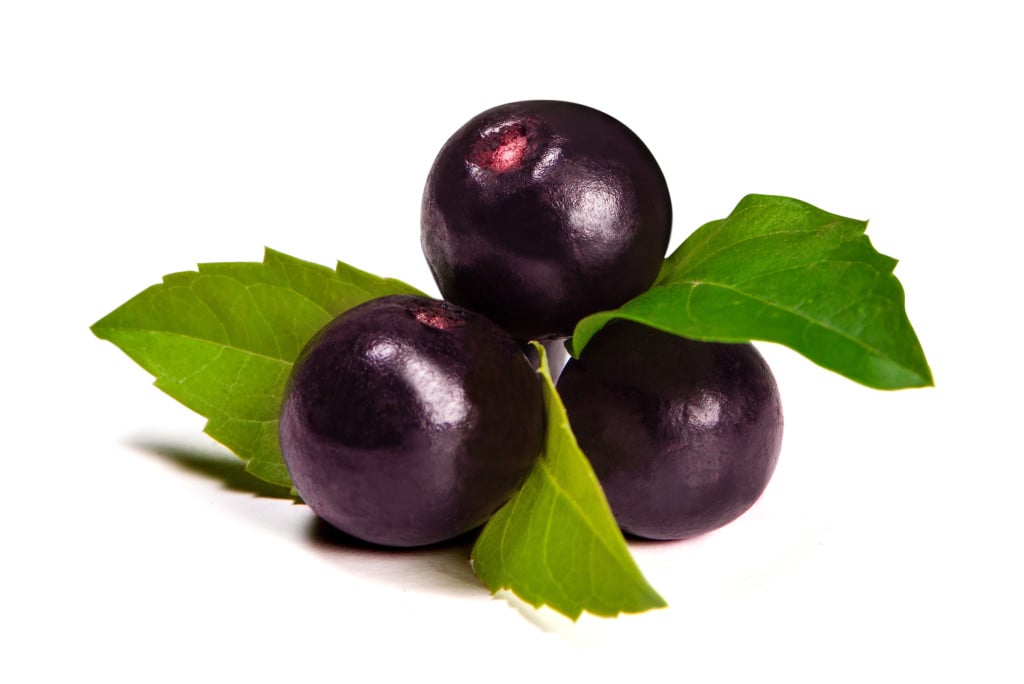By now we’ve all heard about acai — the Brazilian superfruit that’s taken every smoothie bar by storm. But there’s a new berry in town that’s ready to step into the superfood spotlight, and its name is maqui.
The maqui berry has been harvested for thousands of years by indigenous people of Chile, the Mapuche Indians, who consider it a symbol of goodwill and peaceful intention. They also believe drinking maqui juice is what helped them stay strong and powerful to defeat colonists from invading their land.
While these berries may be ripe for the battlefield, what can this superfruit do for the modern day health warriors? Read on to find out!
Maqui: A small antioxidant powerhouse
Like blueberries, maqui (pronounced MAH-KEE) berries grow in the wild — specifically in South America. (We source our organic maqui berries from Chile!) In fact, maqui berries look a lot like blueberries, the only difference being their color.
These South American berries are a deep purple color, which they get from the anthocyanins — the group of antioxidants that give fruit and veggies their color. In fact, studies show maqui has a higher Oxygen Radical Absorbance Capacity (ORAC) score than the blueberry, strawberry, raspberry, blackberry.
Studies show eating foods rich in anthocyanins, like the maqui berry, may prevent certain chronic diseases, such as cancer, type 2 diabetes and heart disease.
This is because antioxidants, like anthocyanins, help fight free radicals. While the body naturally produces these molecules, you’re also exposed to them through chemicals or environmental agents, such as pollution.
Free radicals have a single, unpaired electron. That means they’re reactive and unstable. Because of this, they’ll seek out other molecules to either take away an electron or give them their extra electron. When this happens, more free radicals are created, which causes damage and destroys our cells and DNA.
When too many free radicals are produced, that’s when oxidative stress occurs, which leads to the chronic diseases mentioned above. But a 2015 study published in the “Journal of the American College of Nutrition” shows the antioxidant-rich maqui berries can combat this.
Over the course of four weeks, participants were given 162mg of a maqui berry extract three times a day. Researchers found that maqui not only improved oxidative status in healthy adults, but also overweight adults and adult smokers.

5 benefits of maqui berries
There are even more reasons to add maqui berry to your diet! Here’s how this ancient superfruit can reduce your risk of heart disease, type 2 diabetes and retina damage.
1. Maqui berries can fight inflammation
Inflammation naturally occurs when our body is trying to defend itself against injury or infection. But too much inflammation can lead to chronic diseases, such as type 2 diabetes and heart disease.
However, laboratory studies suggest maqui berry can combat some of these conditions by reducing inflammation. How is that possible? The high levels of anthocyanin in maqui have powerful anti-inflammatory effects.
2. Maqui berries support a healthy heart
New data reveals that 1 out of 5 adults who suffer from a heart attack are under age 40! The reason heart attack patients are becoming younger and younger could be linked to poor habits and lifestyle choices.
“Coronary heart disease begins in childhood and can be found in young adults with alarming frequency. Following a heart protective lifestyle beginning at as young an age as possible and maintaining it for life is a plan to start this month.” says America’s healthy heart specialist and plant-based doctor, Dr. Joel Kahn. (Listen to him on the “Be Sexy, Eat Plants” podcast here.)
An 18 year study suggests eating maqui berry can dramatically lower the risk of heart attacks – predominantly in younger women. In 1989, the Nurse’s Health Study examined 93,600 healthy women ages 25-42, and closely recorded the relationship between diets high in anthocyanins and its effect on their hearts. After years of repeated follow up, the studies confirmed diets high in anthocyanins (the antioxidant compound found in maqui) were associated with a 32% reduced risk of heart attacks, compared to those lowest in these antioxidants.
In addition to reducing heart attacks, maqui berry has also been shown to lower levels of bad cholesterol, which may help reduce the risk of heart disease.
3. Maqui berries are good for the gut
Did you know? There are nearly 100 trillion types of bacteria in your body and most of them live in your intestines!
These are known as your gut microbiota, or the “forgotten organ”, and a huge part of your health depends on it. The health of your gut microbiota can have a positive or negative impact on your digestion, metabolism and immune system. Not forgetting about this organ and keeping it healthy is entirely dependent on your diet. The more nutrient-rich your diet is, the more diverse the bacteria is, which is a good thing!
Unfortunately, the Standard American Diet (SAD) is full of unhealthy fats and added sugar, which can create more bad bacteria than good. And too much bad bacteria can lead to chronic diseases, such as inflammatory bowel disease and cancer.
However, studies show maqui berry can actually re-shape harmful bacteria. The gut microbiota can metabolize anthocyanins and use them to rebuild good bacteria!
4. Maqui berries can help regulate blood sugar levels
Blood sugar, or glucose, is the sugar that develops from the food we eat. We need normal absorption of glucose in order to maintain healthy, functioning organs.
Our pancreas is in charge of balancing our blood sugar levels and producing the hormone insulin. But if there isn’t enough sugar to go around, this can prevent insulin from being distributed. (Type 2 diabetes is a result of the body lacking insulin.)
While more research is needed, there’s promising evidence that maqui can help regulate blood sugar levels and promote healthy insulin distribution.
One study evaluated the effects of Delphinol, a maqui berry extract, on 31 pre-diabetic adults. After three months of taking 180mg of Delphinol per day, patients’ blood sugar levels dropped by 5%, which was enough to bring it down to normal levels.
5. Maqui berries are good for the eyes
Your eyes are exposed to many different types of light per day. From the sun in the sky, to the blue light in our phones and laptops. But too much light exposure can strain your eyes and cause damage to your retina.
Fortunately, studies show that antioxidants – like those found in maqui berry – can prevent light-induced damage to the retina. In one study, maqui berry was able to suppress the light-induced damage in eye cells, due to its high levels of anthocyanins.
How to add maqui berries to your diet
Unless you have a trip planned to South America, chances are you won’t be eating a handful of fresh maqui berry. This sweet-tasting berry (which actually tastes more like a blackberry) grows on wild evergreen trees, and isn’t largely cultivated outside of Chile.
This is actually a good thing! We source our organic maqui berries from local villages in Chile where they rely on this superfruit as a source of income. As maqui popularity continues to rise, we want to make sure we’re supporting local farmers.
But adding maqui berry to your diet is still super easy, especially when you have our Forever Beautiful mix. You’ll not only get the benefits of maqui, but also acai, acerola cherries, maca, blueberries and chia seeds.
By incorporating this mix into your daily routine, you can get healthy glowing skin and more than 100% of the recommended daily value of vitamin C.





